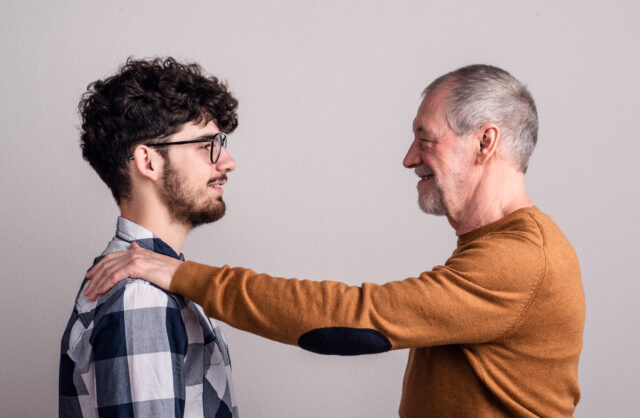You can be fully grown—paying bills, making big decisions, living your own life—and still feel like your parents treat you like you’re 15.

It’s incredibly frustrating, even when it’s subtle. Your parents likely mean well and only want the best for you, but the fact that they’re still acting as if you’re a kid is starting to drive you mad. Here are the signs they’re struggling to see you as an actual adult, even if they don’t realise they’re doing it. If these sound all too familiar, it might be time for a serious chat.
1. They still expect you to run everything by them first.

When you tell them about a choice you’ve made and their first reaction is, “Why didn’t you ask me?”—that’s a sign. They may not mean it in a controlling way, but it suggests they still see themselves as the final authority in your life. You’re allowed to make decisions without getting parental approval. If they’re stuck in the habit of needing to weigh in on everything, it can leave you feeling like your independence doesn’t really count.
2. They give advice like you haven’t already lived through things.

Sometimes parents give advice that sounds like it’s for someone who’s never had a job, paid rent, or been in a relationship. They skip over your experience and talk to you like you’re starting from scratch. It’s not always meant to be patronising, but it can come across that way. You know how to handle hard stuff. If they’d slow down and really listen, they’d see you’ve been figuring out more than they give you credit for.
3. They talk over you when you try to explain your perspective.

If you try to share how you feel or what’s going on in your life, and they cut you off or dismiss it with a “You’re just being sensitive,” that’s a red flag. It shows they still see you through the lens of a younger, less developed version of yourself. Grown adults deserve to be heard and understood, especially by their parents. You don’t have to agree on everything, but you should be able to speak without being treated like you don’t know your own mind.
4. They still make jokes about you being irresponsible.

Even if it’s said with a laugh, those “you’d forget your head if it wasn’t attached” comments can hurt, especially when you’re out here holding down a full life. It can feel like they’re clinging to outdated narratives of who you used to be. It’s frustrating when your growth gets overshadowed by old habits or childhood slip-ups. People change. And being stuck in that kind of humour makes it harder for them to see how much you’ve actually evolved.
5. They treat your opinions like a phase.

If you express something meaningful—your values, your lifestyle, your beliefs, and they wave it off as “something you’ll grow out of,” it’s a pretty clear sign they haven’t accepted your adulthood yet. It’s hard to feel taken seriously when your identity keeps getting put in the temporary box. You’re allowed to grow and change, yes, but you’re also allowed to stand by what feels real to you without being talked down to.
6. They still expect you to fall into your old role at family gatherings.

Maybe they still introduce you as “the baby,” or expect you to act the same way you did growing up—quiet, agreeable, playing peacekeeper. When your role in the family never updates, it can feel like you’re stuck in time, no matter how much you’ve changed. This one’s tricky because it’s often subconscious. However, when your voice doesn’t carry the same weight as the other adults in the room, it’s hard not to feel sidelined or minimised.
7. They jump in to fix things you didn’t ask them to fix.

Say you mention a bad day or a frustrating moment, and before you’ve even finished, they’re offering solutions or calling someone on your behalf. It might come from a good place, but it can also feel like they don’t trust you to handle your own life. Support is great, but only when it’s offered with respect for your autonomy. Sometimes the most helpful thing a parent can say is, “Do you want help or do you just want to vent?”
8. They still expect you to live by their rules when you visit.

Being back in your childhood home can instantly throw you back into old dynamics, especially if they expect you to report where you’re going, keep curfews, or avoid topics they’re uncomfortable with. It’s one thing to be respectful. It’s another to feel like you’re not allowed to have adult boundaries or routines just because you’re sleeping under their roof. You shouldn’t have to shrink just to keep the peace.
9. They downplay your struggles because they’ve “been through worse.”

If you open up and get hit with a “Well, back in my day…” story, it can feel like your pain doesn’t count unless it measures up to theirs. This kind of one-upping creates distance instead of connection. Just because your challenges look different doesn’t mean they’re less valid. You’re not asking for a competition; you’re asking to be seen where you are, in your life right now.
10. They act surprised when you do something mature or competent.

Getting praise is great, but if it’s laced with shock, it can leave you feeling weird. Like when they say, “Wow, you actually handled that really well,” as if they didn’t expect you to. It suggests they’ve still got you boxed into a younger version of yourself. And while people do grow at different speeds, consistent surprise at your adulting skills eventually stops feeling flattering.
11. They assume you’ll change your mind on major life choices.

Whether it’s about not having kids, moving far away, or choosing a certain kind of career, some parents hold onto hope that you’ll “come to your senses” later on. They might not say it directly, but it hangs in the air. That mindset treats your current decisions as temporary detours instead of real, informed choices. It’s hard to feel fully respected when your life plans are constantly being treated as placeholders.
12. They share your personal business without asking.

Parents who still see you as a kid might not think twice about sharing updates about your life with relatives, friends, or neighbours. Even if it’s well-meaning, it can feel invasive, especially if they didn’t check with you first. Adults get to control their own narratives. If your privacy keeps getting overlooked, it’s a sign they’re struggling to adjust to the idea that your life belongs to you now, not them.
13. They expect you to drop everything when they need something.

If your time, schedule, or responsibilities are always expected to take a back seat the second they call, that’s a sign they haven’t fully moved into seeing you as an adult with a full life of your own. You want to be there for your parents—but not at the cost of your own wellbeing or commitments. Being reliable shouldn’t mean being treated like you don’t have limits.
14. They struggle to ask instead of tell.

Instead of, “Would you be up for helping me with this?” you get “You need to do this.” It’s a subtle change in tone, but it says a lot about how they view your independence, and your right to say no. Adults talk to each other with mutual respect. If your parent slips back into the habit of giving orders, it’s worth noticing whether they’re really seeing you as a peer or still stuck in the old hierarchy.
15. They don’t ask about your life unless you bring it up.

When you’ve been cast in the “kid” role for too long, parents sometimes stop being curious about your life. They talk about what matters to them, or the rest of the family, but forget to ask how you’re really doing. You shouldn’t have to push for attention or updates like you’re still trying to prove yourself. Being asked, “How’s work going?” or “Are you happy lately?” can mean more than people realise.
16. They still see you through the lens of who you were, not who you are.

You might’ve grown, healed, evolved—but they still talk to you like you’re the teenager who used to slam doors or cry easily. It’s like they hit pause on your development and forgot to press play again. It hurts when someone you love holds onto an outdated version of you. And while change takes time, being seen clearly—as the adult you’ve become—is something every grown child deserves.




